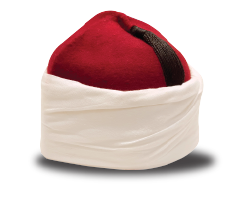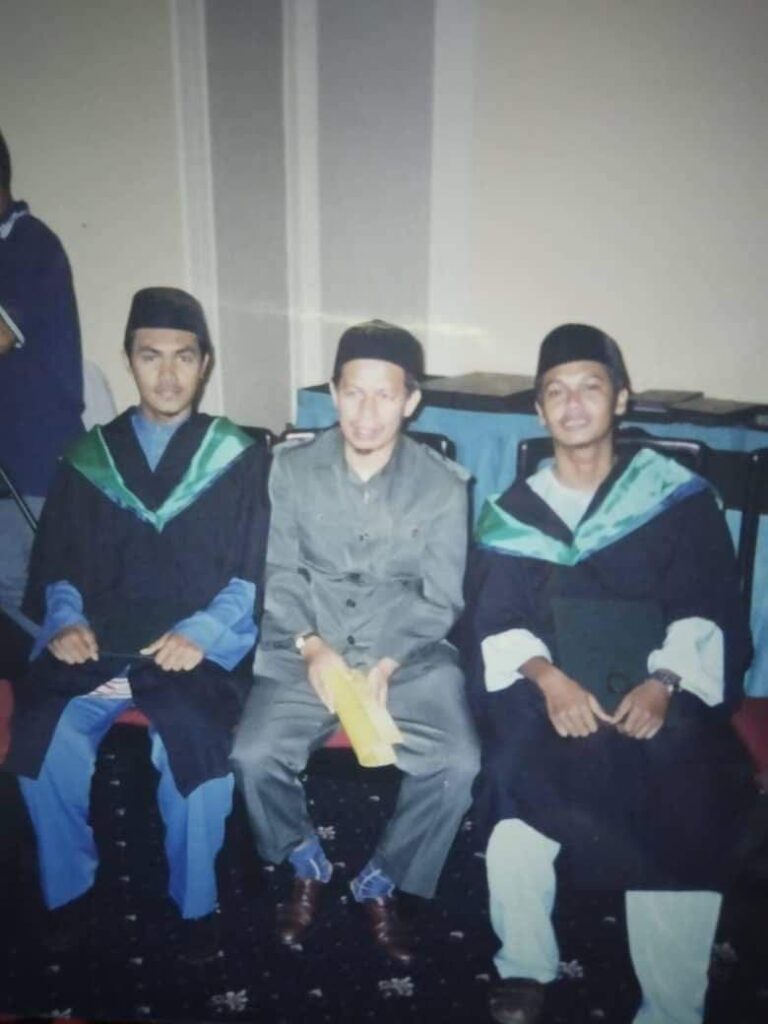Memoir Eng
Chapter 48: Learning Not Only in the Classroom
Diploma in Islamic Studies Program is a new program founded as a result of the joint venture of Zulkifli and his colleagues such as Ustaz Nafis Borhan, Ustaz Sabri Awang, Ustaz Azman Che Mat, Ustazah Hayati and Ustazah Jami’ah. The representatives from the National Accreditation Board (LAN) and Quality Assurance Division, Ministry of Higher Education (BJK, KPT) have come and visited UNITI College to monitor the Teaching & Learning process handled by lecturers for Islamic Studies subjects. For Zulkifli’s class, it is monitored by Dr Abdul Samat Musa, one of the appointed panels. He is one of the lecturers at Islamic University Malaysia (KUIM).
Thanks to the determination of the administration, commitment from the lecturers, Zulkifli’s hope to create a Diploma in Islamic Studies at UNITI College is successful and Zulkifliis appointed as the Head of the Program.
“The fuqaha have divided khilaf into several parts. First, ikhtilaf tanawwu’. Second, ikhtilaf afham. And third, ikhtilaf tudhad. I’ll give an easy example for each of these ikhtilaf.” Zulkifli explained in front of his class.
Seldom would he refer to his notes during his lecture in his class. Zulkifli is more comfortable teaching with his own style and the examples he included are simple and closer to his students. Maybe, this difference is what makes his class feel ‘alive’ and among the students’ favourite. He’s disciplined with his class and is always on time in finishing his class ensuring it is not a long-winded lecture. His explanations are concise, accurate and he adopts a simple language so that even students with no basic education in Arabic and religion could understand his lectures.
“First, ikhtilaf tanawwu’. This ikhtilaf usually occurs when there are numerous dalil (evidences) for a type of worship. A person may sometimes practise based on one dalil of the worship. Sometimes, he will follow another dalil for the same worship. Sometimes, he will then follow yet another dalil for the same worship. For example, the recitation of iftitah. In a narration from Abu Hurairah radhiyallahu ‘anhu. The Prophet PBUH recited:
اللَّهُمَّ بَاعِدْ بَيْنِي وَبَيْنَ خَطَايَايَ كَمَا بَاعَدْتَ بَيْنَ المَشْرِقِ وَالمَغْرِبِ اللَّهُمَّ نَقِّنِي مِنَ الخَطَايَا كَمَا يُنَقَّى الثَّوْبُ الأَبْيَضُ مِنَ الدَّنَسِ اللَّهُمَّ اغْسِلْ
“O Allah! Set me apart from my sins (faults) as the East and West are set apart from each other and clean me from sins as a white garment is cleaned of dirt (after thorough washing). O Allah! Wash off my sins with water, snow and hail.” [1]
In another hadith narrated from A’isyah radhiyallahu’anha, she said, when Rasullullah PBUH wakes up at night, he will begin his prayer by the recitation:
اللهُمَّ رَبَّ جَبْرَائِيلَ وَمِيكَائِيلَ وَإِسْرَافِيلَ فَاطِرَ السَّمَاوَاتِ وَالْأَرْضِ عَالِمَ الْغَيْبِ وَالشَّهَادَةِ أَنْتَ تَحْكُمُ بَيْنَ عِبَادِكَ فِيمَا كَانُوا فِيهِ يَخْتَلِفُونَ اهْدِنِي لِمَا اخْتُلِفَ فِيهِ مِنَ الْحَقِّ بِإِذْنِكَ إِنَّكَ تَهْدِي مَنْ تَشَاءُ إِلَى صِرَاطٍ مُسْتَقِيمٍ
“O Allah, Lord of Gabriel, and Michael, and Israfil, the Creator of the heavens and the earth, Who knowest the unseen and the seen; Thou decidest amongst Thy servants concerning their differences. Guide me with Thy permission in the divergent views (which the people) hold about Truth, for it is Thou Who guidest whom Thou wilt to the Straight Path.” [2]
“The first and second recitation is different, right? We can practise with both of the recitations but the rewards for each recitation are different for there are differences in the wording of them and Rasullullah PBUH has recited with both of these recitations.”
“KRIIIIIIIINNGGGG…” The bell signalling the end of the class and the time for the lunch break at 1 pm rung.
Zulkifli ended his class and informed his students. “Insya-Allah I’ll continue the discussion of ikhtilaf afham and ikhtilaf tudhah in tomorrow’s class. As for Tafaqquh Fiddin Matan Ajurrumiah and Fath al-Qarib classes, they will be held as usual at 2.30 p.m. today at the surau. Thank you all…”
***************
Zulkifli has a very close relationship with all his students. He is generous towards his students, giving them allowances and even treating them. It’s not unusual to see his students bringing along rice cooker, rice and other cooking utensils and ingredients to his class on campus, for they will periodically cook and eat together in trays. Every student is divided into groups each with their own tasks.
“Razmalinda, you and 2-3 of your friends will be in charge of cooking. Mea, for the money I gave you just now, that’s to buy the ingredients. Try and recruit your friends who are good at cooking. We are making Nasi Lemak today.” Zul instructed as he allocated tasks for his students, Razmalinda and Razman.
Zulkifli’s experience of learning from the masyaikh at the Islamic University of Medina where his classes are sometimes held at a date farm, and then they will cook and eat together after class is what he practised at UNITI College. It decreases the stress of his students and builds a stronger and closer relationship between students and lecturers.
“Ustaz, I have a question. What is the ruling of eating with one’s left hand?” Hasrulnizam asked. Several students giggled and snickered, maybe thinking that it is such an inconsequential question. The freshly prepared dishes are served and ready to eat. Their stomachs grumbled and they are all hungry to eat. It’s just that usually, they will listen to a brief tazkirah by Zulkifli himself before they eat.
Zulkifli responded, “A great question. The majority of scholars of madhhab Hanafi, Maliki, Syafie and Hanbali hold the opinion that eating with one’s right hand is sunnah and encouraged and it is makruh to eat with one’s left hand if it is not an exigent circumstance. Most scholars of madhhab Syafie are of the opinion that the ruling of eating with one’s right hand is sunnah and encouraged. This is presented by Imam al-Ghazali and Imam al-Nawawi. When you go back, you can refer in Al-Bahr al-Ra’iq, al-Bariqah al-Mahmudiyyah, Hasyiyah al-‘Adawi, and Mughni al-Muhtaj. According to one of the qaul of Imam al-Syafi’e, he emphasized the ruling of eating with one’s right hand as obligatory.”
“Why is it makruh? It’s because the Prophet PBUH once rebuking a person who refuses to eat with his right hand:
أَنَّ رَجُلاً أَكَلَ عِنْدَ رَسُولِ اللَّهِ -صلى الله عليه وسلم- بِشِمَالِهِ فَقَالَ « كُلْ بِيَمِينِكَ ». قَالَ لاَ أَسْتَطِيعُ قَالَ « لاَ اسْتَطَعْتَ ». مَا مَنَعَهُ إِلاَّ الْكِبْرُ. قَالَ فَمَا رَفَعَهَا إِلَى فِيهِ.
“A man ate with his left hand in the presence of Messenger of Allah (ﷺ), whereupon he said, “Eat with your right hand.” The man said: “I cannot do that.” Thereupon he (the Prophet (ﷺ)) said, “May you not be able to do that.” It was vanity that prevented him from doing it and he could not raise it (the right hand) up to his mouth afterwards.” [3]
******************
“Isn’t studying with Zul fun? You get to eat with everyone together. I bet you’ll like it.” Grandpa Aki said to his granddaughter, Sarah.
“Yes, yes, yes! It’ll be so much fun. I’ll get to eat together with my friends and lecturer. There are times when the class is serious and there’re times when it’s relaxed. However, he’s always teaching something. Grandpa, the class at the surau that you mentioned just now, the one where they’ll learn from the books, what was that? I don’t really get it.” Sarah asked Grandpa Aki.
Grandpa Aki smiled and replied, “Oh, that is the class for them to study the book Matan Ajurrumiah, it’s about Nahu (Arabic grammar). The other one is the class for the book Fath al-Qarib, a Fiqh Madhhab Syafie book. Zul will sit in the middle of a circle of his students. All of his students have to memorize the matan of Ajurrumiah. Zul will check every one of his students’ memorizations. So, one by one, his student will get up and walk towards him to the middle of the circle to recite his memorization. Zul did this when he was appointed as the head of the Islamic Studies Program. He decided to do it in order to strengthen the basis of the religious knowledge of all his students.”
Sarah nodded in understanding.
_________________________________________
[1] Sahih al-Bukhari, no. 744 and Muslim, no. 598.

